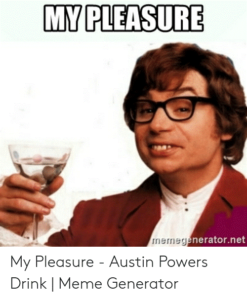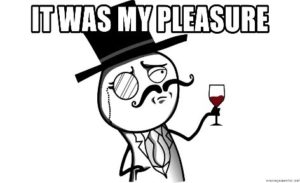Did someone just thank you for your assistance? You could reply with 'my pleasure' to let them know it wasn't any trouble for you. This post unpacks the meaning and origin of this expression.
Meaning
The expression 'my pleasure' is a courtesy said after someone thanks you for something. It's a more emphatic and polite way of saying 'you're welcome.' Many people use the longer form of 'it was my pleasure' when responding to 'thank you.' Both expressions have the same meaning.
If you say 'my pleasure' as a response to 'thank you,' it implies that you were happy to lend assistance to the other person. It means you're happy to help and don't require monetary compensation for lending a hand.
If you use 'my pleasure,' you're telling the other person that they don't owe you anything for the help. It's a way of saying that you don't expect anything in return for lending assistance.
Example Usage
“It was my pleasure. Whenever you need a hand with something around the house, just call me. I’m home most days and always willing to help.”
“My pleasure. It’s not often that I get to hand out with you guys. Let me take you all out for lunch so we can celebrate.”
“Trust me, it’s my pleasure. I live for doing this kind of stuff. Anything I can do to contribute to my community.”
“It’s my pleasure, really. There’s no need to pay me anything for this; I’m not in it for the money. I’m just glad I could help.”
“My pleasure. It’s so nice to meet a young boy with manners. I can tell your parents raised you right.”


Origin
The expression 'my pleasure' originates from the word 'pleasure.' The English lexicon's first record of 'pleasure' is from the late 14th century. The original meaning of pleasure is 'discretion, will, desire, preference.' It references 'at one's pleasure' or 'when one wishes.'
The sexual reference to pleasure originates from the mid-15th century, defined as 'gratification; feeling of enjoyment, liking.'
However, language experts are unsure of when 'my pleasure' entered the English lexicon as a pleasantry. Some experts believe it appeared in the 17th century as part of pleasantry and a greeting to other people.
Phrases Similar to My Pleasure
- You’re welcome.
- No problem.
- Anytime.
- No worries.
Phrases Opposite to My Pleasure
- I don’t care.
What is the Correct Saying?
- My Pleasure.
Ways People May Say My Pleasure Incorrectly
The phrase 'my pleasure' doesn't refer to feelings of pleasure. You won't use it to describe sensations of joy or happiness. It's a courtesy to the other person, thanking them for their appreciation of our efforts.
Acceptable Ways to Phrase My Pleasure
You can use the phrase 'my pleasure' after someone thanks you for something you did for them. For instance, your partner could say thanks for setting the table for dinner, and you reply with 'my pleasure' to let them know it wasn't any hassle for you. The phrase suits all occasions where you want to express that you enjoyed helping someone out, and it was no bother to you.
The phrase suits social and professional use. You can say it at the office when the boss thanks you for delivering a report on time. You could use it with friends when they thank you for buying them dinner. It's an additional pleasantry to the other person, showing mutual respect for them and appreciation for them respecting your efforts to help them out.